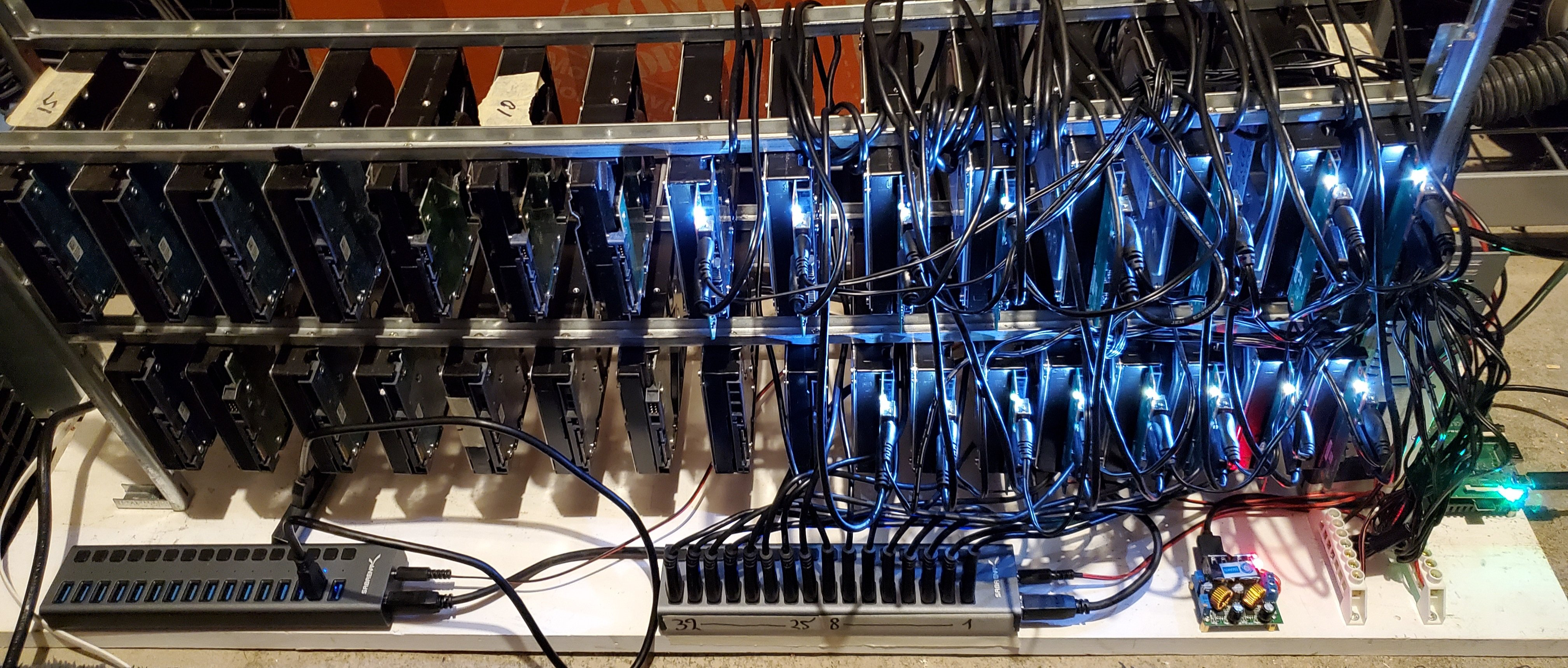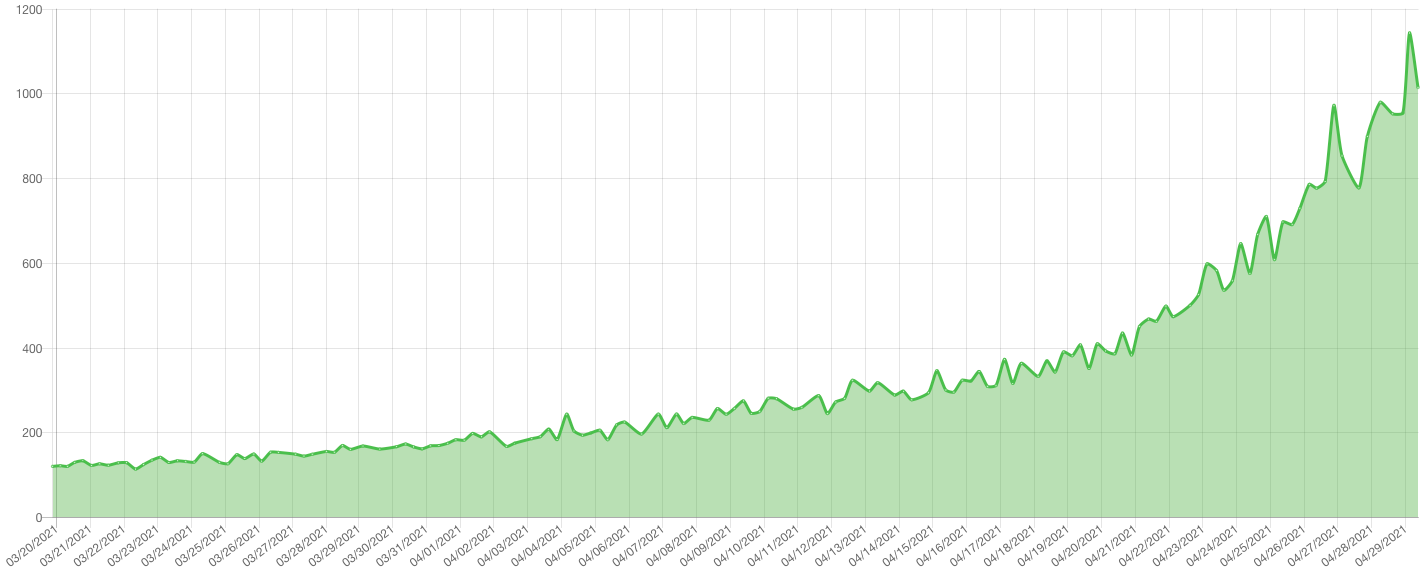Chia Currency Has Already Used 1 Exabyte of Storage
This new crypto currency relies on storage space, rather than processing power.
Just when we thought that smart cities, smart factories, IoT devices, autonomous vehicles, and robots will be the main generators of data that will require storage space in the coming years, Chia Coin cryptocurrency just demonstrated that it will also be a formidable generator of data, at least for the time being.
In a about a month's time storage space allocated to Chia network increased from 120PB all the way to 1143PB, or 1.14 Exabytes. 1.14EB equals 1,140,000TB, or 63,333 20TB hard drives.
Chia is a proof of space-time cryptocurrency that uses storage space on farmers' systems to store a collection of cryptographic numbers called 'plots.' When the blockchain broadcasts a challenge for the next block, farmers' systems scan their plots to see if they have the hash that is closest to the challenge. This method eliminates the Proof of Work concept used by Bitcoin and Ethereum therefore lowering vast power requirements for mining, which developers of Chia call 'farming.'
Meanwhile, the probability of winning a block is the percentage of the total space that a farmer has compared to the entire network, which essentially means that someone with more available space has more chances to win. So, while accelerators and GPUs are not needed for Chia farming, someone with more storage space to host more plots earns more.
At present a minimum size plot requires around 101GB of storage space and 4GB of RAM, so when one wants to store 100 K32 plots, they need a system with slightly more than 10TB of space, which is not too expensive. Meanwhile, creation of each plot requires 4GB of DRAM, so creating 100 plots in parallel would require 400GB of system memory, which cost quite a sum, yet almost nobody does it.
One of the moderators of r/Chia at Reddit noted. "The RAM and storage space used to make the plots is reused to make new plots, so one only needs as much SSD space and RAM as needed to create the number of plots they want to create at one time, either singularly or in parallel," he said.

Thousands of Chia farmers now build machines with tens of HDDs that can store tens terabytes of data. While one of such drives does not consume a lot — about 6.5W when operating and about 5.6W when idling — tens of such HDDs can consume hundreds of Watts when they work and usually more when starting up. For example, a system with 32 Western Digital HC550 18TB HDDs (like the one pictured above) powered by a monster motherboard with 32 SATA ports can consume around 180W when idling, which does not count power consumption of memory and compute modules.
Get Tom's Hardware's best news and in-depth reviews, straight to your inbox.
For obvious reasons, there are no consumer PC chassis or NAS boxes with 32 3.5-inch bays. Meanwhile, rack-based chassis with backplanes for data centers are quite expensive. As a result, hardware used for Chia farming is either DIY or designed specifically for this purpose and nothing else. Essentially, in just about several months' time a new segment of hardware market for Chia farming has developed.
One recommended way to save power and money is to use Raspberry Pi to farm Chia Coin after you've built the plots on a PC.
It remains to be seen how Chia cryptocurrency mining will develop going forward. But at this rate the amount of storage space used by Chia network will be gargantuan a year from now.

Anton Shilov is a contributing writer at Tom’s Hardware. Over the past couple of decades, he has covered everything from CPUs and GPUs to supercomputers and from modern process technologies and latest fab tools to high-tech industry trends.
-
frodoitsmyname Lol 400 GB of RAM needed...euhm no you don't.Reply
You only need RAM when creating the plots, not to farm them.
so 4GB per plot, means a 32GB machine can make around 8 plots a time -
thisisaname ReplyMeanwhile, the probability of winning a block is the percentage of the total space that a farmer has compared to the entire network, which essentially means that someone with more available space has more chances to win.
Sounds a bit like a lottery, will it need to be licensed in some places? -
spongiemaster Is anything useful done with the storage space, or is it all just wasted space that can't be used for anything else? If that's how it works, who thought that was a good idea?Reply -
InvalidError Reply
Since the idea is from BitTorrent Cohen, I would hope there is a distributed storage layer on top of the initial proof-of-space-time that transactions will be based on.spongiemaster said:Is anything useful done with the storage space, or is it all just wasted space that can't be used for anything else? If that's how it works, who thought that was a good idea? -
hotaru.hino ReplyMeanwhile, the probability of winning a block is the percentage of the total space that a farmer has compared to the entire network, which essentially means that someone with more available space has more chances to win
Do I have a better chance of winning the Powerball jackpot? -
Exploding PSU I know a mate who jumped into farming Chia. I heard that (heavy emphasis on heard, so it's hearsay) that if you have less than 100 TB you basically have no chance of winning. They haven't made an official pooling for it so you're basically going solo versus all the big players, and there's already this Chinese pool that controls about 1/3 of the entire storage power, so that's that.Reply
Also, he said that this is still in its infancy. Expect the numbers to go up like mad in the next few months. -
InvalidError Reply
That would be true for practically all cryptos, your chances of a payout are closely related to your hashing/storage power vs the rest of the network.exploding_psu said:I heard that (heavy emphasis on heard, so it's hearsay) that if you have less than 100 TB you basically have no chance of winning. -
Exploding PSU ReplyInvalidError said:That would be true for practically all cryptos, your chances of a payout are closely related to your hashing/storage power vs the rest of the network.
Well in Ethereum pools even if you have the suckiest GPU around, as long as it's still somewhat above the minimum threshold for mining, you can still get something in return. Not much, but at least there's payout even though it's like 0.0000001 ETH.
Here, it's more like "if you don't splurge for hundreds of TB, you're getting exactly 0", a massive barrier to entry.
Don't ask me though, I'm just a regular Vega 56 user waiting for the GPU prices to come down so I could upgrade to something with more RGB bling
